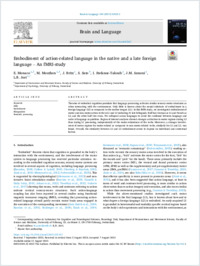Embodiment of action-related language in the native and a late foreign language – An fMRI-study
PSPE
- Monaco, E. Department of Neuroscience and Movement Science, Faculty of Science and Medicine, University of Fribourg, Switzerland
- Mouthon, M. Department of Neuroscience and Movement Science, Faculty of Science and Medicine, University of Fribourg, Switzerland
- Britz, J. Department of Neuroscience and Movement Science, Faculty of Science and Medicine, University of Fribourg, Switzerland
- Sato, S. Department of Psychology, University of Fribourg, Switzerland
- Stefanos-Yakoub, I. Department of Neuroscience and Movement Science, Faculty of Science and Medicine, University of Fribourg, Switzerland
- Annoni, J.M. Department of Neuroscience and Movement Science, Faculty of Science and Medicine, University of Fribourg, Switzerland
- Jost, L.B. Department of Neuroscience and Movement Science, Faculty of Science and Medicine, University of Fribourg, Switzerland
- 12.08.2023
Published in:
- Brain and Language. - Elsevier BV. - 2023, vol. 244, no. 105312, p. 1-12
English
Theories of embodied cognition postulate that language processing activates similar sensory-motor structures as when interacting with the environment. Only little is known about the neural substrate of embodiment in a foreign language (L2) as compared to the mother tongue (L1). In this fMRI study, we investigated embodiment of motor and non-motor action verbs in L1 and L2 including 31 late bilinguals. Half had German as L1 and French as L2, and the other half vice-versa. We collapsed across languages to avoid the confound between language and order of language acquisition. Region of interest analyses showed stronger activation in motor regions during L2 than during L1 processing, independently of the motor-relatedness of the verbs. Moreover, a stronger involvement of motor regions for motor-related as compared to non-motor-related verbs, similarly for L1 and L2, was found. Overall, the similarity between L1 and L2 embodiment seems to depend on individual and contextual factors.
- Faculty
- Faculté des lettres et des sciences humaines
- Department
- Département de Psychologie
- Language
-
- English
- Classification
- Psychology
- License
- Open access status
- hybrid
- Identifiers
-
- DOI 10.1016/j.bandl.2023.105312
- ISSN 0093-934X
- Persistent URL
- https://folia.unifr.ch/unifr/documents/325957
Statistics
Document views: 96
File downloads:
- embodimentofaction-relatedlanguage: 140
